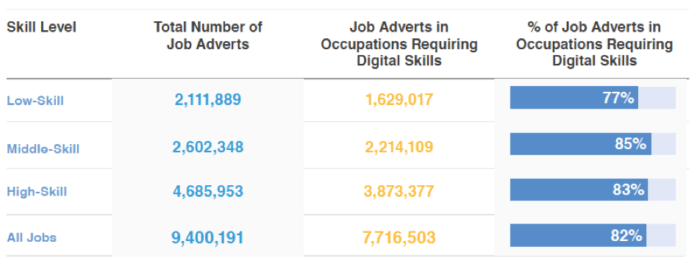Digital Skills Gap 2020
& The Digital Marketing Skills Gap
WHAT COURSE ARE YOU LOOKING FOR?
-

Digital Skills Gap
27 Jul 2020The significant and growing digital skills gap poses one of the biggest threats to UK employment levels, competitiveness and productivity, according to a number of major studies.
Industry and government bodies have warned that there is not enough training provided in digital skills, from school age through to the workplace.
They have also warned that employers are not investing enough in up-skilling their staff in the digital skills they need to meet their current and future needs.
The result will be reduced productivity and missed opportunities for UK businesses, amounting to £billions of lost revenue and reduced profits.
With the continuing presence of COVID 19, this underlying weakness in our industrial strategy has been significantly magnified.
Not only has our buying behaviour dramatically shifted online, but all organisations are also being forced to manage, communicate and market themselves through digital platforms.
So we set out to answer a few questions:
What is the current digital skills gap in the UK?
What is the current digital marketing skills gap in the UK?
What are the risks of low-level digital marketing skills for businesses?
What has the effect of COVID 19 on the Digital Skills Gap?
What can be done to close the Digital Skills Gap?
What is the current digital skills gap in the UK?
In 2019, the UK Government Department for Digital, Culture, Media and Sport (DCMS) commissioned a report on the demand for Digital Skills in the UK.The report when published was titled ‘No Longer Optional: Employer Demand for Digital Skills’
A pretty clear statement on their findings.
The report examined millions of job adverts in the UK to assess the demand and supply of digital skills.
It stated that digital skills are essential entry requirements for two-thirds of UK SOC occupations1 and these occupations account for 82% of online job vacancies.
The requirement for digital skills varied from basic skills such as Microsoft Word to advanced skills such as programming.
The fact that the large majority of jobs being advertised asked for these skills clearly illustrates how important these skills are to employers.

Source: No Longer Optional: Employer Demand for Digital Skills, Julia Nania, Hal Bonella, Dan Restuccia, and Bledi Taska, June 2019
This report is a continuation of a theme that has been discussed in government and industry for many years.
The 2017 Employer Skills Survey reported a third of all skill-shortage vacancies were attributed, at least in part, to a lack of ‘digital skills’.
The digital skills gap in the UK was deemed so serious at the time that the House of Commons Science and Technology Committee released a report called simply Digital Skills Crisis.
But still little has been done by the government or employers to address this gap in knowledge and skills.
What is the Digital Marketing Skills Gap?
Of particular interest to me, as a digital marketing trainer, is the gap in skills within marketing.M Training was set up because there appeared to be a gap in digital knowledge and skills; both in practising marketing professionals and in new graduates.
Even today we get digital marketing graduates on our courses who only have a basic understanding of the key digital marketing skills most companies would want, such as SEO, Analytics and online advertising.
Our anecdotal evidence is backed by a number of studies.
A report by the Digital Marketing Institute, tested marketing professionals in the UK (plus the US and Ireland) on their digital skills against a series of benchmarks. They reported that only 8% of general marketers attained entry-level digital marketing skills, with all others falling short.
In the UK, only 37% of those who classed themselves as digital marketing professionals achieved a competent level in the skills-based test, and 69% of marketers felt they needed to improve their digital marketing skills to remain competent in their role in the future.
As early as 2012 a Government report2 asserted that by 2020 there was expected to be a rapid ‘hollowing out’ of the digital and creative sector, where the need for intermediate skills decreases and demand instead increases for high–level skills.
Several years later, has the digital marketing skills gap changed much? It appears not.
The Institute of Digital and Direct Marketing conducted a census of marketers into whether they felt they had received training in key skills necessary for career progression.
The results, released in July 2018, showed that 49% felt they had not.
Digital marketing skills was the area which saw the biggest skills gaps, behind management training.
What are the risks of low-level digital marketing skills?
The primary risk arising from a lack of digital marketing skills is that there simply won’t be enough people to fill certain roles.This, in turn, means that businesses using digital marketing will be less able to plan and put into practise effective strategies and campaigns.
And the costs in employing people with those skills will increase.
Deloitte describes ‘digital maturity’ in its May 2018 Digital Disruption Index report. It states that ‘digitally maturing organisations are able to adapt and align their strategy, workforce, culture and technology to meet ongoing digital advances in a way that other organisations struggle to achieve’.
In the modern world, companies which don’t aspire to digital maturity will find themselves falling behind rapidly.
There are of course thousands of great marketers working across digital projects, but without the specific skills needed in certain areas - like PPC, SEO, Analytics, Social Marketing & core coding skills - they will be far less effective, and constantly hampered by their lack of expertise.
For companies, this will mean lost opportunities, greater costs and lower productivity in their marketing departments.
For those in marketing roles, it will be harder to for them to do their job effectively, harder to get a promotion, and they will find it harder to justify the value of the work they do.
For marketing professionals and graduates looking for a job, a lack of digital marketing skills will make it very hard to land the higher paid, higher-skilled jobs.
Ultimately a lack of digital marketing skills will lead to lost opportunities and underperformance, and that’s not something any organisation or person wants.
What has the effect of COVID 19 had on the Digital Skills Gap?
Despite the tightening of belts that will inevitably follow the COVID pandemic, organisations and individuals need to focus on long term survival in an increasingly online world.The landscape has been changing for many years and the pandemic has simply accelerated the pace.
According to Digital Commerce 360, US online sales increased by 76% in June 2020 in comparison to June 2019. ($73.2 B / $41.5B)
In a survey by The Drum, 90% of consumers are now spending more online than they were before the pandemic.
Ecommerce is set to become the “new norm” in a post-pandemic world with 59% of 25-36 year olds3 saying that their increased online shopping will continue once things return to normal.3
It is not just e-commerce that is driving the move online. Zoom the online meeting and conferencing platform has grown it’s daily users from 10 million to 200 million in March 2020. A lot of these new users are on a free licence but the use by organisations with over 10 employees grew by over 354% in the past few months.
Whilst there has been a growth in online video training during the pandemic, High-quality training has historically been a casualty of cost-cutting in uncertain times.
I have many contacts in the training industry and the evidence I have seen would suggest that this is likely to be the outcome again. Whilst M Training has remained quite busy we, and all of the trainers I know, have reported that companies are rolling back on their training programs, including major organisations. (Source: Zoom 2020)
This will be a double whammy for UK business – as the demand for digital skills grows, the investment in quality training looks likely to fall.
What Can Be Done to close the Digital Skills Gap?
Developing digital skills requires time and money but we cannot blame companies for taking care of their cash flow at these times.One thing we can do is to encourage the government to support business. Not through free cash giveaways (such as the probably ineffective £1000 per retained employee scheme) but through targeted investment in skills and technologies that will make our businesses more competitive, productive and profitable.
Previous schemes encouraging employers to invest in the digital skills of their staff have often been European Union schemes, such as the European Social Fund, There is now a void of such schemes and this needs to be addressed either directly or through your Chamber of Commerce or MP.
We, also, cannot leave it to the government alone. Organisations must wake up to the future requirements of an increasingly digital world and be prepared to invest in the skills of their staff.
The simplest way to go about this is to undertake a digital skills audit of your staff, which will give you clear data about where your digital skills weaknesses are.
This data can then feed into plans for a structured training programme.
If you want help to undertake a Digital Marketing Skills audit please contact us
Special Offer – Every little helps!
To help our clients and other forward-looking organisations prepared to invest in their staff in these difficult times we are offering a 20% discount on all our Digital Skills Courses. (Use code DigiGap20 when booking)
This offer includes any booking of the following courses in September 2020::
Digital Marketing Courses:
Digital Marketing – 2 Day Course
Google Ads
Google Analytics
Social Media
Social Media Advertising
Search Engine Optimisation
SEO Advanced
Email Marketing
MailChimp
Website Design Optimisation
Photoshop
LinkedIn
Microsoft Courses
Excel (All levels)
PowerPoint
Microsoft Word
Microsoft SharePoint
Microsoft Outlook
Leadership Courses
Remote Team Management
Notes / References
1 SOC is UK’s Standard Occupational Classifications
2 Sector Skills Insights: Digital and Creative, UK Commission for Employment and Skills
3 ChannelAdvisor, 2020
Author
 Martin Woodfield is a Digital Marketing Trainer, running courses for M Training and various universities. He is a Fellow of the Chartered Institute of Marketing and has worked for some of the UKs leading companies. He has 20 years experience in digital marketing and has worked in senior marketing roles for over 30 years,
Martin Woodfield is a Digital Marketing Trainer, running courses for M Training and various universities. He is a Fellow of the Chartered Institute of Marketing and has worked for some of the UKs leading companies. He has 20 years experience in digital marketing and has worked in senior marketing roles for over 30 years,
Related Blogs
-

SEO Quiz 2020
24 Apr 2020Do you know your title tags from you meta descriptions? Test your knowledge with this SEO Quiz 2020
Read More -

Remote Team Management: 9 Tips on How to Manage Your Virtual Team Successfully
15 May 2020Many managers have been thrown into managing teams remotely without any prior training or experience and there can be unique problems that occur when managing virtual teams. Take a read of our article for tips on how to manage your team remotely.
Read More -

Google Ads Checklist 2024
24 May 2024Use this checklist to ensure that your Google Ads campaigns are correctly set up so you're not wasting budget.
Read More





























